| Listing 1 - 10 of 55 | << page >> |
Sort by
|
Book
Year: 2022 Publisher: [Place of publication not identified] : Peter Lang International Academic Publishers,
Abstract | Keywords | Export | Availability | Bookmark
 Loading...
Loading...Choose an application
- Reference Manager
- EndNote
- RefWorks (Direct export to RefWorks)
Der interdisziplinäre Band postuliert eine Macht des Kontextes und erklärt, was darunter verstanden wird. Die Beiträge beleuchten und hinterfragen die Macht des Kontextes in dessen Relationen zu Sprache(n), Gesellschaft(en) und Medien. Dies geschieht teils aus philologischem, teils aus sozialwissenschaftlich-kommunikationswissenschaftlichem Blickwinkel und schließt jeweils mit Thesen zur Macht des Kontextes. Der Fokus in den Beiträgen lässt sich entlang der sozialwissenschaftlichen Ebenen (Mikroebene, Mesoebene, Makroebene) differenzieren. Mit Blick auf die gewonnenen Erkenntnisse eröffnet sich die Perspektive einer breit verstandenen Kontextlinguistik, und es werden Impulse und Anknüpfungspunkte für weitere Forschung in den Einzeldisziplinen sowie für disziplinenverbindende Forschung geboten.
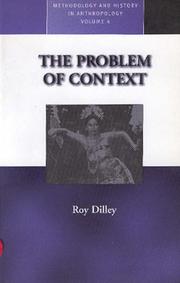
ISBN: 1571817735 157181700X Year: 1999 Publisher: New York (N.Y.) : Berghahn books,
Abstract | Keywords | Export | Availability | Bookmark
 Loading...
Loading...Choose an application
- Reference Manager
- EndNote
- RefWorks (Direct export to RefWorks)
Context (Linguistics) --- Cultural relativism --- Ethnology --- Methodology --- Philosophy --- Context (Linguistics). --- Cultural relativism. --- Methodology. --- Philosophy.
Book
ISBN: 3957438608 9783957438607 Year: 2015 Publisher: [Place of publication not identified] MENTIS Verlag
Abstract | Keywords | Export | Availability | Bookmark
 Loading...
Loading...Choose an application
- Reference Manager
- EndNote
- RefWorks (Direct export to RefWorks)
Die Interpretation literarischer Texte macht es erforderlich, Kontexte einzubeziehen. Kontexte spielen eine zentrale Rolle bei der Feststellung der Bedeutungen, die im Rahmen von Interpretationen typischerweise ermittelt werden. Die Relevanz von Kontexten für die wissenschaftliche Untersuchung von Literatur ist unstrittig, weswegen sie in der fachlichen Praxis in aller Regel berücksichtigt werden. Dieser Schein der Selbstverständlichkeit verschwindet jedoch sehr schnell, wenn man einfache Fragen stellt wie: Was genau heißt eigentlich »Kontext«? Wie hängen Text und Kontext zusammen? Wie sind Kontexte bei der Interpretation einzubeziehen? Solche Fragen konstituieren das »Text-Kontext-Problem«. Es handelt sich um ein textwissenschaftliches Grundlagenproblem, das trotz seiner Wichtigkeit bisher nicht die erforderliche Aufmerksamkeit erhalten hat. In dieser Arbeit wird es zum ersten Mal ausführlich und im Zusammenhang untersucht. Der literaturwissenschaftliche Grundbegriff »Kontext« wird in operationalisierbarer Weise expliziert, Überlegungen zu einem anschlussfähigen Text-Kontext-Modell werden angestellt und die allgemeine Methodik des Kontextualisierens in Grundzügen charakterisiert.
Literature --- Context (Linguistics) --- Contextualism (Philosophy) --- Philosophy. --- Theory, etc.
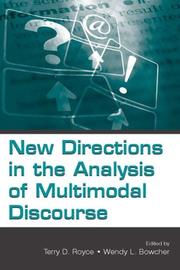
ISBN: 9781138839342 9780805851069 Year: 2014 Publisher: New York Routledge
Abstract | Keywords | Export | Availability | Bookmark
 Loading...
Loading...Choose an application
- Reference Manager
- EndNote
- RefWorks (Direct export to RefWorks)
Communication --- Context (Linguistics) --- Discourse analysis --- Modality (Linguistics) --- Semiotics --- Methodology
Book

ISBN: 1282784099 9786612784095 3110227770 3110227762 9783110227772 9783110227765 9783110227765 9781282784093 6612784091 Year: 2010 Publisher: Berlin Boston
Abstract | Keywords | Export | Availability | Bookmark
 Loading...
Loading...Choose an application
- Reference Manager
- EndNote
- RefWorks (Direct export to RefWorks)
This volume brings together original papers by linguists and philosophers on the role of context and perspective in language and thought. Several contributions are concerned with the contextualism/relativism debate, which has loomed large in recent philosophical discussions. In a substantial introduction, the editors survey the field and map out the relevant issues and positions.
Context (Linguistics). --- Semantics. --- Context (Linguistics) --- Semantics --- Languages & Literatures --- Philology & Linguistics --- Formal semantics --- Semasiology --- Semiology (Semantics) --- Grammar, Comparative and general --- Situation (Linguistics) --- Context --- Comparative linguistics --- Information theory --- Language and languages --- Lexicology --- Meaning (Psychology) --- Linguistics --- Discourse Analysis. --- Interpersonal Communication. --- Pragmatics.
Book

ISBN: 9783110303728 9783110305234 3110305232 3110303728 Year: 2013 Publisher: Berlin Boston
Abstract | Keywords | Export | Availability | Bookmark
 Loading...
Loading...Choose an application
- Reference Manager
- EndNote
- RefWorks (Direct export to RefWorks)
The grammar of negative polarity items is one of the challengesfor linguistic theory. NPIs cross-cut all traditional categories in grammar and semantics, yet their distribution is by no means arbitrary. Theories of NPI licensing have been proposed in terms of syntax, semantics, and pragmatics - each with its own merits and problems. The volume comprises state-of-the-art studies and suggests an interpolation approach to NPI licensing.
Polarity (Linguistics) --- Grammar, Comparative and general --- Context (Linguistics) --- Polarité (Linguistique) --- Négations (Linguistique) --- Contexte --- Negatives. --- Polarity item (Linguistics) --- Linguistic analysis (Linguistics) --- Negatives (Grammar) --- Situation (Linguistics) --- Linguistics --- Context --- Philology

ISBN: 311032086X 9783110320862 9783937202617 3937202617 3110320606 9783110320602 3937202617 9783110320602 1299724418 Year: 2013 Volume: Bd. 8 Publisher: Berlin Boston
Abstract | Keywords | Export | Availability | Bookmark
 Loading...
Loading...Choose an application
- Reference Manager
- EndNote
- RefWorks (Direct export to RefWorks)
The thought and the findings of moral particularism are extended to contextualism. Moral particularism asserts that reasons for moral actions are not governed by general principles, but by a mixture of situation bound deliberation and values. Particularism was established in the area of moral philosophy and its main results include delimitation with various forms of moral generalism. Many insights were accumulated along the way. The book claims that a serious contextualist approach needs to embrace particularist normativity. Thesis is then applied to the traditional areas of philosophy such as semantics, epistemology and ontology. This makes it possible to ask questions about the positive and not just negative story and about the wider impact of particularism. The book is an attempt of such a positive story. Foundations are laid for an exciting new field of research in the main systematic branches of philosophy, urging you to rethink the normative basis of semantics, epistemology and metaphysics, in their interweaving with moral thought. The importance of narration and of phenomenology is stressed for these areas.
Contextualism (Philosophy) --- Knowledge, Theory of. --- Context (Linguistics) --- Grammar, Comparative and general --- Situation (Linguistics) --- Linguistics --- Epistemology --- Theory of knowledge --- Philosophy --- Psychology --- Context
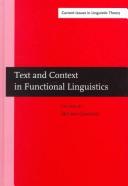
ISBN: 9027236747 155619885X 9786612163807 1282163809 9027299676 9789027299673 9781556198854 Year: 1999 Publisher: Amsterdam : Benjamins,
Abstract | Keywords | Export | Availability | Bookmark
 Loading...
Loading...Choose an application
- Reference Manager
- EndNote
- RefWorks (Direct export to RefWorks)
The shift towards a sociolinguistic approach to the analysis of language in the last few decades has necessitated new definitions for a number of concepts that linguists have taken for granted for a long time. This volume attempts to demystify the important notions of 'text' and 'context' by providing clear definitions and examples within the assumptions of Systemic Functional (SF) linguistics. After a discussion of the role and significance of context by three eminent SF linguists in section one, the influence of context on text is dealt with in section two 'From Context to Language'. Section
Pragmatics --- Context (Linguistics). --- Discourse analysis. --- Functionalism (Linguistics). --- Context (Linguistics) --- Discourse analysis --- Functionalism (Linguistics) --- Philology & Linguistics --- Languages & Literatures --- Functional analysis (Linguistics) --- Functional grammar --- Functional linguistics --- Functional-structural analysis (Linguistics) --- Grammar, Functional --- Grammatical functions --- Linguistics --- Structural linguistics --- Discourse grammar --- Text grammar --- Semantics --- Semiotics --- Grammar, Comparative and general --- Situation (Linguistics) --- Context
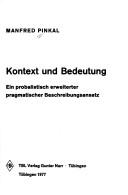
ISBN: 3878080859 9783878080855 Year: 1977 Volume: 85 Publisher: Tübingen: Narr,
Abstract | Keywords | Export | Availability | Bookmark
 Loading...
Loading...Choose an application
- Reference Manager
- EndNote
- RefWorks (Direct export to RefWorks)
Pragmatics --- Context (Linguistics) --- Semantics --- Data processing --- -Pragmatics --- Pragmalinguistics --- General semantics --- Language and languages --- Logic, Symbolic and mathematical --- Semantics (Philosophy) --- Formal semantics --- Semasiology --- Semiology (Semantics) --- Comparative linguistics --- Information theory --- Lexicology --- Meaning (Psychology) --- Grammar, Comparative and general --- Situation (Linguistics) --- Linguistics --- Philosophy --- Context --- Pragmatics. --- Data processing. --- Context (Linguistics). --- Semantics - Data processing
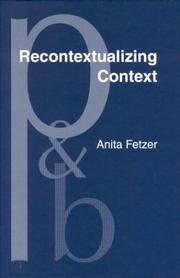
ISBN: 9027253633 1588115100 9786612160608 1282160605 9027295719 Year: 2004 Volume: 121 Publisher: Amsterdam : Benjamins,
Abstract | Keywords | Export | Availability | Bookmark
 Loading...
Loading...Choose an application
- Reference Manager
- EndNote
- RefWorks (Direct export to RefWorks)
In the humanities and social sciences, context is one of those terms which is frequently used and frequently referred to, but hardly made explicit.This book proposes a model for describing the multifaceted connectedness between language and language use, and between cognitive context, linguistic context, social context and sociocultural context and their underlying principles of well-formedness, grammaticality, acceptability and appropriateness. Combining a range of theoretical frameworks in linguistics, pragmatics, sociolinguistics, discourse analysis and philosophy of language, Fetzer goes beyond the unilateral conception of speech and argues for a dialogue outlook on natural-language communication based on dialogue principles and dialogue categories. The most important ones are cooperation, joint production, micro and macro communicative intentions, micro and macro validity claims, co-suppositions, dialogue-common ground and communicative genre.
801.56 --- 801.56 Syntaxis. Semantiek --- Syntaxis. Semantiek --- Grammar --- Pragmatics --- Context (Linguistics) --- Grammaticality (Linguistics) --- Acceptability (Linguistics) --- Acceptability (Linguistics). --- Context (Linguistics). --- Grammaticality (Linguistics). --- Grammaticalness (Linguistics) --- Grammar, Comparative and general --- Linguistics --- Situation (Linguistics) --- Sociolinguistics --- Context --- LANGUAGE ARTS & DISCIPLINES --- Linguistics / General --- Philology & Linguistics --- Languages & Literatures
| Listing 1 - 10 of 55 | << page >> |
Sort by
|

 Search
Search Feedback
Feedback About UniCat
About UniCat  Help
Help News
News